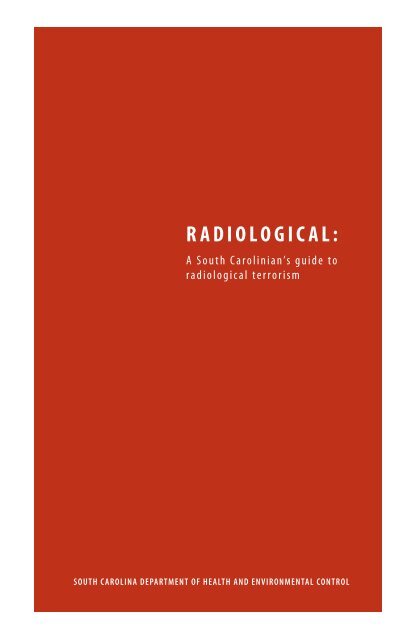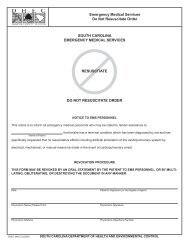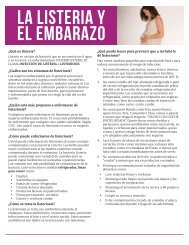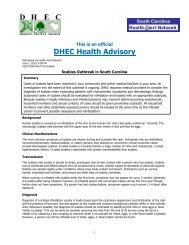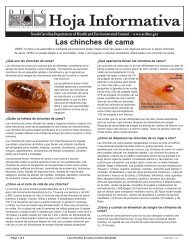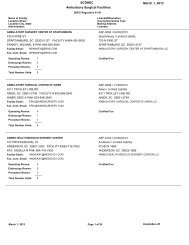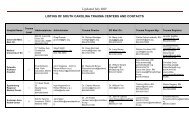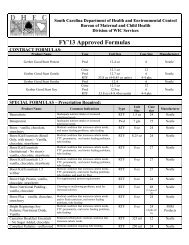RADIOLOGICAL: - Department of Health and Environmental Control
RADIOLOGICAL: - Department of Health and Environmental Control
RADIOLOGICAL: - Department of Health and Environmental Control
Create successful ePaper yourself
Turn your PDF publications into a flip-book with our unique Google optimized e-Paper software.
R A D I O L O G I C A L :<br />
A South Carolinian’s guide to<br />
radiological terrorism<br />
SOUTH CAROLINA DEPARTMENT OF HEALTH AND ENVIRONMENTAL CONTROL
TACTICS AGAINST TERRORISM: <strong>RADIOLOGICAL</strong><br />
South Carolina <strong>Department</strong> <strong>of</strong> <strong>Health</strong> <strong>and</strong> <strong>Environmental</strong> <strong>Control</strong><br />
Office <strong>of</strong> Public <strong>Health</strong> Preparedness
What is radiation?<br />
Radiation is a form <strong>of</strong> energy that is all around us. Radiation comes<br />
from both man-made <strong>and</strong> natural sources. There are different types <strong>of</strong><br />
radiation. Some have more energy than others.
What is radiological terrorism?<br />
Terrorists might use a radiological attack to create fear, disrupt the economy, or to get<br />
a response from the government.<br />
Radiological terrorism involves using radioactive material as a weapon. The most<br />
common methods are the spreading <strong>of</strong> contaminated material through the use <strong>of</strong> a<br />
radiation dispersal device (RDD) or “dirty bomb,” the use <strong>of</strong> an improvised nuclear<br />
device (IND), or an attack on a nuclear facility such as a nuclear power plant. All<br />
methods could produce immediate injuries or death. Also, they have the ability to take<br />
advantage <strong>of</strong> the public’s fear <strong>of</strong> radiation.<br />
A terrorist might also use a radiation-emitting device (RED). This type <strong>of</strong> device does<br />
not explode but provides a means <strong>of</strong> exposure to radiation.<br />
What is a “dirty bomb”?<br />
A dirty bomb is not the same as a nuclear bomb.<br />
A dirty bomb uses dynamite or other explosives to scatter radioactive dust, smoke, or<br />
other material that causes radioactive contamination over a small area. When a dirty<br />
bomb explodes, most <strong>of</strong> the radioactive material would likely fall to the ground within<br />
a few miles <strong>of</strong> the explosion.<br />
A dirty bomb can hurt people in two ways. First, the explosion <strong>of</strong> the bomb can hurt<br />
or kill people. Second, radioactive material spread by the explosion is likely to remain<br />
for a long time <strong>and</strong> can produce illness due to exposure to the material. Since a dirty<br />
bomb may appear at first to be a conventional bomb, people covered with radioactive<br />
dust may spread the problem when they flee the area.<br />
It is hard to design an RDD that would spread enough radiation to cause immediate<br />
harm to public health or kill a large number <strong>of</strong> people from the radiation exposure<br />
alone.<br />
The main purpose <strong>of</strong> a dirty bomb is to scare people <strong>and</strong> contaminate<br />
buildings or l<strong>and</strong> with radioactive material. A dirty bomb would make these<br />
places unsafe for living or working for a short time, disrupting lives <strong>and</strong><br />
businesses.<br />
Some symptoms <strong>of</strong> exposure can occur shortly after the incident. Other symptoms<br />
could take months or years to create health problems.
What is a nuclear bomb?<br />
A nuclear bomb involves the splitting <strong>of</strong> atoms. This causes a huge release <strong>of</strong> energy<br />
that makes an explosion that is thous<strong>and</strong>s to millions <strong>of</strong> times stronger than the kind<br />
<strong>of</strong> explosion caused by a dirty bomb.<br />
When a nuclear bomb explodes, it causes a nuclear blast that makes a powerful wave<br />
<strong>of</strong> heat, light, air pressure <strong>and</strong> radiation. It also makes a fireball that completely<br />
destroys everything in its path, including water <strong>and</strong> soil, <strong>and</strong> carries it up into the<br />
air. This destruction creates a mushroom cloud. This cloud contains tiny particles <strong>of</strong><br />
radioactive dust <strong>and</strong> debris that can fall on a very large area.<br />
When radioactive dust falls back down to earth, it is known as “nuclear fallout”.<br />
This fallout can be carried for miles by the wind. Since fallout is radioactive, it can<br />
contaminate anything it l<strong>and</strong>s on, including food <strong>and</strong> water. A nuclear blast would<br />
likely cause a great deal <strong>of</strong> damage, death <strong>and</strong> injury, <strong>and</strong> affect a wide area. How you<br />
are affected by a nuclear blast will depend on the size <strong>of</strong> the bomb <strong>and</strong> how far away<br />
you are from the explosion.<br />
Terrorists may be more likely to use a dirty bomb than a nuclear bomb. Use <strong>of</strong> chemical,<br />
biological <strong>and</strong> nuclear weapons requires a lot <strong>of</strong> scientific knowledge. It takes much<br />
less knowledge <strong>and</strong> skill to create a conventional bomb that spreads radioactive<br />
material. A dirty bomb is also less expensive than a nuclear bomb.<br />
How can you be exposed to radiation?<br />
You are exposed to small doses <strong>of</strong> radiation every day. This exposure is considered<br />
normal <strong>and</strong> is not a threat to your safety. This exposure comes from radiation found in<br />
small amounts in:<br />
•<br />
•<br />
•<br />
•<br />
•<br />
•<br />
•<br />
•<br />
Water<br />
Food grown in soil (soil can have elements with radioactive properties)<br />
Buildings made <strong>of</strong> stone, concrete or brick (materials can have some elements<br />
with radioactive properties)<br />
Sunlight<br />
X-rays <strong>and</strong> other medical tests <strong>and</strong> treatments<br />
Smoke detectors<br />
Previous nuclear weapons testing<br />
Coming into contact with a contaminated person or object.
How will I know if there is a radiological attack?<br />
You cannot see, smell, feel or taste radiation. You may not know immediately if you<br />
have been exposed to radiation. It is important to be aware <strong>of</strong> things going on around<br />
you <strong>and</strong> to watch for people doing things that are suspicious or seem unusual.<br />
Emergency responders have equipment to detect radiation <strong>and</strong> will know how much,<br />
if any, radiation is in the area <strong>and</strong> whether you are in danger. Public <strong>of</strong>ficials will let you<br />
know if there has been a radiological attack <strong>and</strong> what to do.<br />
Symptoms<br />
Large doses <strong>of</strong> radiation can be deadly. But a dirty bomb would not likely spread<br />
enough radiation to cause immediate illness or symptoms.<br />
Higher levels <strong>of</strong> radiation can cause:<br />
• Nausea<br />
•<br />
•<br />
•<br />
•<br />
Vomiting<br />
Diarrhea<br />
Swelling <strong>and</strong> redness <strong>of</strong> the skin<br />
Hair loss.<br />
If you have any <strong>of</strong> these symptoms after a radiological incident, you should get medical help<br />
right away.<br />
What is the difference between radiation<br />
exposure <strong>and</strong> contamination?<br />
Radiation exposure: Radioactive materials give <strong>of</strong>f a type <strong>of</strong> energy that travels in<br />
invisible waves or particles called radiation. When you are exposed to radiation, the<br />
energy goes through your body. For example, you are exposed to safe amounts <strong>of</strong><br />
radiation when you have an x-ray. Being exposed to radiation doesn’t mean you are<br />
contaminated with radioactive material.<br />
Radioactive contamination: Contamination occurs when radioactive material gets<br />
on or inside a person or object. Radioactive materials released in the environment can<br />
contaminate air, water, surfaces, soil, plants, buildings, people or animals. There are<br />
two types <strong>of</strong> radioactive contamination:
•<br />
•<br />
Internal contamination: This happens when you swallow or breathe in<br />
radioactive material. It can also happen when radioactive material enters your<br />
body through an open wound or is absorbed through your skin. Some types <strong>of</strong><br />
radioactive materials leave the body through blood, sweat, urine <strong>and</strong> feces.<br />
Other types stay in the body in different organs.<br />
External contamination: This happens when radioactive material gets on an<br />
object or on your skin, hair or clothes.<br />
How does radiation exposure affect your health?<br />
There are many ways radiation can affect your health. However, you might not see the<br />
effects for many years. The effects <strong>of</strong> radiation exposure depend on:<br />
•<br />
•<br />
•<br />
•<br />
The amount <strong>of</strong> radiation absorbed by your body<br />
The length <strong>of</strong> time you are exposed<br />
The type <strong>of</strong> radiation you are exposed to<br />
How you were exposed (internal or external).<br />
<strong>Health</strong> effects can be mild, such as reddening <strong>of</strong> the skin. Effects can be serious, such as<br />
increased risk <strong>of</strong> cancer or death.<br />
Being exposed to a large amount <strong>of</strong> radiation can cause death within a few days or<br />
months. Being exposed to lower amounts <strong>of</strong> radiation can lead to an increased risk <strong>of</strong><br />
developing cancer.<br />
Another serious consequence <strong>of</strong> a radiological attack is the psychological impact. Most<br />
people are unfamiliar with radiological <strong>and</strong> nuclear energy. They might become overly<br />
frightened. As a result, they might ignore important instructions from emergency<br />
responders trying to help.<br />
Effects on unborn babies. Radiation is very harmful to unborn babies, especially<br />
in the early weeks <strong>of</strong> pregnancy. This is because babies are rapidly growing <strong>and</strong><br />
developing, making them more vulnerable to radiation. Even amounts <strong>of</strong> radiation too<br />
low to make the mother sick can cause serious birth defects, such as stunted growth,<br />
deformities, abnormal brain function, or cancer that may develop later in life.<br />
Acute Radiation Syndrome (ARS), or radiation sickness, is a short-term but serious<br />
illness that occurs when:<br />
•<br />
•<br />
The amount <strong>of</strong> radiation is high<br />
Exposure is short, but strong
•<br />
•<br />
The radiation reaches internal organs<br />
Most or all <strong>of</strong> the body is exposed to radiation.<br />
Symptoms include reddening <strong>of</strong> the skin that looks like a sunburn, nausea, vomiting,<br />
diarrhea, hair loss <strong>and</strong> low blood cell counts. Later, it can cause you to lose bone marrow,<br />
which would cause you to lose weight, lose your appetite, feel like you have the flu, get<br />
an infection <strong>and</strong> bleed internally. For those who survive, it might take years to recover.<br />
Treatment<br />
Anyone who has swallowed or inhaled radioactive material needs medical help<br />
immediately. There are reliable medicines to take once radiation is swallowed or<br />
inhaled, but only trained medical pr<strong>of</strong>essionals can administer these medicines. They<br />
will decide how to treat your symptoms based on how much <strong>and</strong> what type <strong>of</strong> radiation<br />
you were exposed to.<br />
DHEC has made potassium iodide pills available to people who live within a 0-mile<br />
radius <strong>of</strong> commercial nuclear facilities in South Carolina. Potassium iodide, also known<br />
as “KI,” is not a magic anti-radiation pill. It provides protection for only the thyroid gl<strong>and</strong><br />
against one form <strong>of</strong> radiation. It cannot protect against whole body irradiation or other<br />
forms <strong>of</strong> radioactive elements that could result from a nuclear power plant release. You<br />
should swallow your “KI” pill only when you have been instructed to do so.<br />
Be safe. Be smart: Make a plan.<br />
Radiological terrorism might occur without warning. Being prepared in advance <strong>and</strong><br />
knowing what to do <strong>and</strong> when is important. Having a plan for your family can help you<br />
stay calm. It could also save lives. Remember to go over your plan with your family <strong>and</strong><br />
people you work with regularly so everyone knows what to do to be safe.<br />
A plan for home<br />
Start by making a plan for home. Decide what each family member should do during<br />
a radiological emergency. Make sure you make a disaster supply kit (see section<br />
called “Make a Kit”). Make sure everyone knows where the kit is kept. Remember to<br />
include your pets in your home plan. If you live within 0 miles <strong>of</strong> a nuclear power<br />
plant, stay current with the plant’s emergency warning systems. The plant can provide<br />
you additional information about evacuation routes, shelters, <strong>and</strong> important contact<br />
numbers.
A plan for away from home<br />
You should also plan for a radiological emergency when you <strong>and</strong> your family members<br />
are away from home. Decide how you will let each other know where you are. Many<br />
families will ask an out-<strong>of</strong>-town relative or friend to be their emergency contact person.<br />
It could be easier to make a long-distance phone call than a local phone call during an<br />
emergency. Make sure each family member knows who the emergency contact is <strong>and</strong><br />
has the phone number. Finally, decide where everyone will meet when the emergency<br />
is over.<br />
A plan for work<br />
You should also plan for a radiological emergency at work. It is best to follow your<br />
company’s emergency plan. You may have practiced the plan while at work. If possible,<br />
keep a disaster supply kit where you work (see section called “Make a Kit”). If you own<br />
a business or are in charge <strong>of</strong> other people, make sure they know what to do in case <strong>of</strong><br />
a radiological emergency.<br />
If there is an attack, don’t forget to call your out-<strong>of</strong>-town emergency contact person to<br />
find out if other family members are safe.<br />
A plan for children <strong>and</strong> elderly relatives<br />
If you have children in school or daycare or a relative who lives in a nursing home, find<br />
out what plans each place has for keeping people safe during a radiological emergency.<br />
Discuss these plans with your family. Make sure they underst<strong>and</strong> what to do. Make sure<br />
they know to listen to their teachers or caregivers <strong>and</strong> do what they are told.<br />
Remember that teachers <strong>and</strong> nursing home caregivers are trained to h<strong>and</strong>le<br />
emergencies. They will do their best to make sure your family members are safe.<br />
Unless you are told to do so, do not try to pick up your children or elderly relatives from<br />
school or nursing homes during a radiological emergency. It could put you <strong>and</strong> others<br />
in danger.<br />
A plan for family members with disabilities<br />
If you have a family member with a physical or mental disability, you will need a plan<br />
to meet their special needs. Explain the plan to them. If they are able, practice what<br />
you would do in an evacuation.
Pets <strong>and</strong> farm animals<br />
It is important to have a plan for your animals, too. In a radiological emergency, you<br />
may have to leave your home. It may be difficult or impossible to find a safe place<br />
for your animals to stay. American Red Cross shelters <strong>and</strong> many other shelters cannot<br />
accept pets because <strong>of</strong> health <strong>and</strong> safety rules. There are some exceptions. Animals like<br />
guide dogs that help people with disabilities are usually the only animals allowed in<br />
shelters.<br />
Try to find other places outside <strong>of</strong> your area for your pet to stay. You may be able to<br />
stay in a hotel with your pet. You can ask family or friends to keep your pets or find<br />
a shelter, kennel, or veterinarian that will take care <strong>of</strong> your animals in an emergency.<br />
Keep phone numbers for all <strong>of</strong> these places. When you make your family disaster supply<br />
kit, remember to include food for your animals.<br />
South Carolina has many farms with larger animals such as cows <strong>and</strong> horses. It is more<br />
difficult to find shelter for larger animals. If you have a barn, bring the animals inside,<br />
keep them on stored food <strong>and</strong> water, <strong>and</strong> close doors <strong>and</strong> windows. You may have to<br />
leave larger animals behind if you have to evacuate.<br />
Be safe. Be smart. The best way to protect yourself <strong>and</strong> your family in a radiological<br />
emergency is to make <strong>and</strong> practice a family response plan.<br />
Be safe. Be smart: Make a kit.<br />
If there is a radiological disaster, you may need to stay inside your home for a few<br />
hours or a few days. This is known as having to “shelter in place.” You may be required<br />
to shelter in place for several days until <strong>of</strong>ficials tell you it’s safe to go outside again.<br />
You will not be able to leave to go to the store, out to a restaurant or to church. This<br />
is why you need to keep certain things needed for everyday life like clean water, food<br />
<strong>and</strong> clothing.<br />
If you make a disaster supply kit ahead <strong>of</strong> time, you will have what you need to be as<br />
safe as possible. Make sure everyone in your family knows where the kit is kept. You will<br />
need to replace the water every three months <strong>and</strong> replace the food every six months.<br />
Batteries should be replaced regularly so flashlights work when you need them.
Here is what to include in your Disaster Supply Kit:<br />
•<br />
•<br />
•<br />
•<br />
•<br />
•<br />
•<br />
•<br />
•<br />
•<br />
•<br />
•<br />
•<br />
•<br />
•<br />
•<br />
•<br />
•<br />
•<br />
•<br />
First aid kit<br />
Flashlight<br />
Battery-operated radio<br />
Extra batteries<br />
Bath size towels<br />
Plastic garbage bags or plastic sheeting<br />
Duct tape <strong>and</strong> scissors<br />
Blankets<br />
Emergency phone numbers<br />
Bottled water (at least one gallon for each day for each person, plus water for<br />
pets; plan for at least three days)<br />
Ready-to-eat food that won’t go bad <strong>and</strong> doesn’t need to be refrigerated<br />
Paper plates, cups, plastic utensils <strong>and</strong> a non-electric can opener<br />
Toilet tissue<br />
Medicines <strong>and</strong> a list <strong>of</strong> medicine each person takes<br />
Extra eyeglasses, contact lenses or hearing aids<br />
Change <strong>of</strong> clothing for each person<br />
Personal items like soap <strong>and</strong> deodorant<br />
Baby formula<br />
Pet food<br />
Cash <strong>and</strong>/or an emergency credit card.<br />
Protection in a radiological emergency:<br />
Time, Distance <strong>and</strong> Shielding<br />
A radiological attack or emergency can be very dangerous. People can be seriously<br />
hurt or die. Here are things you should do to protect yourself if there is a radiological<br />
emergency:<br />
Time: decrease the amount <strong>of</strong> time you spend near the source <strong>of</strong> radiation.<br />
Distance: increase your distance from the source <strong>of</strong> radiation. Even walking a short<br />
distance from the scene <strong>of</strong> the attack could protect you.
0<br />
Shielding: Shield yourself from external exposure <strong>and</strong> breathing in radioactive<br />
material. Covering your nose <strong>and</strong> mouth with a cloth or going inside a building or<br />
vehicle can help shield you from radiation.<br />
If you are close to the area where a radiological incident occurs, do the following:<br />
If you are outside <strong>and</strong> close to the incident:<br />
•<br />
•<br />
•<br />
•<br />
•<br />
•<br />
•<br />
If it is a nuclear blast, turn away <strong>and</strong> close <strong>and</strong> cover your eyes to prevent<br />
damage to your eyesight. Drop to the ground <strong>and</strong> put your face down toward the<br />
ground <strong>and</strong> your h<strong>and</strong>s under your body. Stay flat until the heat <strong>and</strong> two shock<br />
waves pass.<br />
Following any type <strong>of</strong> radiological release, you should get out <strong>of</strong> the immediate<br />
area quickly. Go inside the nearest building that has not been damaged.<br />
Shut all windows, doors <strong>and</strong> fireplaces. Turn <strong>of</strong>f fans <strong>and</strong> heating <strong>and</strong> air<br />
conditioning systems.<br />
Stay away from any dust clouds.<br />
Do not touch debris from an explosion. It might be contaminated.<br />
Cover your mouth <strong>and</strong> nose with a cloth to avoid breathing in radioactive<br />
material.<br />
Take <strong>of</strong>f your outer layer <strong>of</strong> clothes <strong>and</strong> seal them in a plastic bag or<br />
container.<br />
Gently wash parts <strong>of</strong> your body not covered by clothing with soap <strong>and</strong> water.<br />
If possible, do this before going into a clean area.<br />
If you are inside <strong>and</strong> close to the incident:<br />
•<br />
•<br />
•<br />
If the windows are not broken, stay where you are <strong>and</strong> do not leave until<br />
you are told it is safe. Shut all windows, doors <strong>and</strong> fireplaces. Turn <strong>of</strong>f all<br />
forced-air heating <strong>and</strong> air-conditioning systems that draw air from outside.<br />
You can leave the unit on to allow the air to recirculate.<br />
If the windows are broken, go to a room where there are no windows or the<br />
windows are not broken.<br />
Take <strong>of</strong>f your outer layer <strong>of</strong> clothes right away <strong>and</strong> seal them in a plastic bag.<br />
Getting your clothes away from you will reduce external contamination <strong>and</strong><br />
help prevent internal contamination. It will also reduce the length <strong>of</strong> time you<br />
are exposed to radiation.
•<br />
•<br />
Gently wash parts <strong>of</strong> your body not covered by clothing with soap <strong>and</strong> water.<br />
First responders will help clean those people closer to the event before finding<br />
those who fled the scene. Avoid getting into your car or on mass transit. You<br />
could endanger other people – including your family – by spreading the<br />
contaminated dust.<br />
If you are in a car <strong>and</strong> close to the incident:<br />
•<br />
•<br />
•<br />
•<br />
•<br />
•<br />
•<br />
Close the windows <strong>and</strong> outside vents on your air conditioning or heating<br />
system. Use only the “recirculate” function, if possible.<br />
Cover your nose <strong>and</strong> mouth with a cloth to avoid breathing in radioactive dust<br />
or smoke.<br />
If you are close to your home, <strong>of</strong>fice or public building, go there right away<br />
<strong>and</strong> go inside.<br />
Once you are inside, take <strong>of</strong>f your outer layer <strong>of</strong> clothes right away <strong>and</strong> seal<br />
them in a plastic bag. Getting your clothes away from you will reduce external<br />
contamination <strong>and</strong> help prevent internal contamination. It will also reduce the<br />
length <strong>of</strong> time you are exposed to radiation.<br />
Gently wash parts <strong>of</strong> your body not covered by clothing with soap <strong>and</strong> water.<br />
If you cannot get to your home or another building safely, stop at the safest<br />
place possible.<br />
Listen to the radio for information <strong>and</strong> instructions.<br />
In all situations:<br />
•<br />
•<br />
•<br />
•<br />
•<br />
Listen to your emergency broadcast stations on the radio or television.<br />
Listen carefully to the instructions <strong>of</strong> law enforcement, emergency response<br />
<strong>and</strong> public health <strong>of</strong>ficials <strong>and</strong> do as they say. It is important for you to trust<br />
them. They have the training <strong>and</strong> the information about the situation to tell<br />
you what you should do.<br />
Don’t use your phone unless it is a life-threatening emergency.<br />
Don’t eat, drink, smoke or do anything that could bring potentially radioactive<br />
material to your mouth. Wait until after contamination is removed from your<br />
skin <strong>and</strong> clothing.<br />
If you are seriously injured, get medical help as soon as possible by calling<br />
- - or the operator.
Your clothes<br />
It is important to avoid contact with radioactive material or objects that are<br />
contaminated. If there is a radiological attack <strong>and</strong> medical help isn’t available right<br />
away, here are things you should do:<br />
•<br />
•<br />
•<br />
•<br />
•<br />
•<br />
Your body<br />
Take <strong>of</strong>f your outer layer <strong>of</strong> clothing, starting from the top <strong>and</strong> working your<br />
way down to your socks. Getting your clothes away from your body normally<br />
removes most <strong>of</strong> the external contamination <strong>and</strong> helps prevent internal<br />
contamination. It will also reduce the length <strong>of</strong> time you are exposed to<br />
radiation.<br />
Try not to let contaminated clothes touch your bare skin. Any clothes that have<br />
to be pulled over your head should be cut <strong>of</strong>f instead. Radioactive particles on<br />
the clothing could hurt you if inhaled or swallowed.<br />
Put the clothes in a plastic bag. Avoid touching contaminated areas <strong>of</strong> the<br />
clothes. Use tongs or a similar object if you need to. Anything that touches the<br />
clothes should be put in the bag with them.<br />
Seal the bag, then seal that bag inside another plastic bag.<br />
Help family members <strong>and</strong> children remove their clothing. Avoid touching the<br />
contaminated clothes with your bare h<strong>and</strong>s. Try not to let the contaminated<br />
clothes touch the skin <strong>of</strong> other people.<br />
Put the bags where others will not touch them <strong>and</strong> keep them until authorities<br />
tell you what to do with them. They can be used later to find out how much<br />
radiation you were exposed to, which could determine the treatment you<br />
need. They might be used as evidence by law enforcement, too.<br />
It is important to avoid contact with radioactive materials. If there is a radiological<br />
attack <strong>and</strong> medical help isn’t available right away, here are things you should do:<br />
•<br />
•<br />
•<br />
•<br />
•<br />
•<br />
Try to gently wash any radioactive material <strong>of</strong>f your body.<br />
Use warm, running water (not hot or cold, if possible) <strong>and</strong> soap if you have it.<br />
Do not scrub. Blot dry.<br />
Be sure to wash your hair.<br />
Try not to spread contamination to parts <strong>of</strong> the body that may not be<br />
contaminated, such as areas that were covered by clothing.<br />
Put all towels, soap <strong>and</strong> washcloths in the bag with your contaminated<br />
clothes.
•<br />
•<br />
•<br />
•<br />
If you get dust that could be contaminated in your eyes, flush them with<br />
running water for at least five minutes.<br />
If you have breathed in dust that could be contaminated, blow your nose<br />
frequently.<br />
Put on clean clothes.<br />
Get medical help as soon as it is safe to leave your shelter.<br />
Be safe. Be smart: Be aware.<br />
What is your risk?<br />
It is possible for a terrorist to commit a large-scale radiological attack. Some radioactive<br />
materials are not hard to get because they are used by certain South Carolina businesses<br />
<strong>and</strong> industry. Other radioactive materials are transported on trains, trucks, or boats<br />
that travel through our towns, cities <strong>and</strong> ports. Here are some keys for assessing your<br />
risk <strong>of</strong> a radiological attack or emergency:<br />
•<br />
•<br />
Learn about radioactive materials that might be stored near your home.<br />
Radiological attacks have the potential to kill more people in indoor spaces or<br />
crowded areas. Be aware <strong>of</strong> your surroundings in:<br />
Buildings<br />
Subways<br />
Sports arenas<br />
Concert halls <strong>and</strong> auditoriums.<br />
How you might be told <strong>of</strong> a radiological emergency<br />
Public <strong>of</strong>ficials will alert you <strong>of</strong> a radiological emergency as quickly as possible. Here is<br />
how you will be alerted:<br />
•<br />
•<br />
•<br />
•<br />
•<br />
•<br />
•<br />
•<br />
•<br />
You might hear a siren.<br />
You might be called by telephone. The voice on the other end could be a person<br />
or a recorded message.<br />
Emergency workers might drive by <strong>and</strong> give instructions over a loudspeaker.<br />
Emergency workers might come to your door <strong>and</strong> warn you.<br />
The Emergency Alert System on television or radio might alert you.
Be safe. Be smart. Listen carefully <strong>and</strong> do exactly what emergency workers tell<br />
you to do. South Carolina’s emergency responders are trained to help <strong>and</strong> protect<br />
you. You should trust them.<br />
Helping others<br />
If you find someone who has been exposed to radiation, the first thing you should do<br />
is make sure you don’t become a victim, too. Avoid close contact.<br />
If the person has swallowed or inhaled radioactive material, call EMS or - - right<br />
away. Tell the operator where you are located <strong>and</strong> the phone number you are calling<br />
from. Describe what has happened. Listen to the operator <strong>and</strong> do what he or she tells<br />
you to do. Stay on the phone until the operator tells you to hang up.<br />
If you are trained in CPR or first aid <strong>and</strong> are sure you are safe, take care <strong>of</strong> the victims’<br />
life-threatening injuries first. Then try to treat other injuries. You will be better<br />
prepared for an emergency if you are trained in CPR <strong>and</strong> first aid before a disaster<br />
happens.<br />
Evacuation after a radiological emergency<br />
Law enforcement <strong>and</strong> public health <strong>of</strong>ficials might decide it will be safer for you to<br />
evacuate in a radiological emergency. You might need to go to an emergency shelter.<br />
It is important to stay calm, listen carefully <strong>and</strong> follow instructions. If you are told to<br />
evacuate, listen to your radio or television <strong>and</strong> make sure the order applies to you.<br />
Listen to find out if you need to evacuate right away or if you have time to pack basic<br />
things you might need.<br />
If you are told to evacuate right away, you should:<br />
•<br />
•<br />
•<br />
•<br />
Take your disaster supply kit <strong>and</strong> medicine.<br />
Close <strong>and</strong> lock your windows <strong>and</strong> doors.<br />
Shut <strong>of</strong>f forced-air ventilation systems in your home.<br />
Move quickly <strong>and</strong> calmly.<br />
If you have time to pack basic things, you should take:<br />
•<br />
•<br />
•<br />
Your family disaster supply kit <strong>and</strong> medicine<br />
A change <strong>of</strong> clothing for each family member<br />
Eyeglasses, hearing aids, dentures, canes or walkers needed by family<br />
members
•<br />
•<br />
•<br />
Personal items like toothbrushes <strong>and</strong> deodorant<br />
Baby items like diapers, formula or baby food<br />
Books, puzzles, cards or games for entertainment.<br />
Shelters will not have everything you need. In most cases, the shelters will provide<br />
only meals, cots <strong>and</strong> blankets.<br />
You don’t need to turn <strong>of</strong>f your refrigerator or freezer. You should turn <strong>of</strong>f all other<br />
appliances <strong>and</strong> lights before locking your home when you leave.<br />
Check on neighbors to make sure they know about the emergency <strong>and</strong> <strong>of</strong>fer to help<br />
people with disabilities or other special needs.<br />
Take only one car to the evacuation site. Close your car windows <strong>and</strong> allow your air<br />
conditioning or heating system to only recirculate the air in your car. If you need a<br />
ride, ask a neighbor. If there are no neighbors who can help you, listen to the radio or<br />
television for instructions. Don’t take shortcuts. For your safety, follow the exact route<br />
you are told to take.<br />
Shelter in place<br />
In a radiological emergency, you might be told to “shelter in place”. This means staying<br />
where you are <strong>and</strong> making yourself as safe as possible until the emergency is over or<br />
you are told to evacuate. If you are told to shelter in place, you should:<br />
•<br />
•<br />
•<br />
•<br />
•<br />
•<br />
Take your children <strong>and</strong> pets indoors right away.<br />
Cover your mouth <strong>and</strong> nose with a damp cloth, if you’re outside. If you might<br />
have been contaminated, remove your outer layer <strong>of</strong> clothing <strong>and</strong> shoes <strong>and</strong><br />
put them in a plastic bag before going inside to avoid bringing radioactive<br />
material into your shelter. Leave clothes <strong>and</strong> shoes outside.<br />
Close all windows in your home.<br />
Turn <strong>of</strong>f heating <strong>and</strong> air conditioning systems.<br />
Close your fireplace <strong>and</strong> any other place air can come in from outside.<br />
Go to the room that you’ve picked ahead <strong>of</strong> time as your shelter room. The safest<br />
place in your home during a radiological emergency is near the middle <strong>of</strong> your<br />
home or in the basement. A large room with a water supply or bathroom <strong>and</strong><br />
a telephone is best. This room should have as few windows as possible. This<br />
is different from sheltering in place for a chemical disaster, when the shelter<br />
should be high in the home.
•<br />
•<br />
•<br />
•<br />
•<br />
•<br />
•<br />
•<br />
Take your Disaster Supplies Kit with you.<br />
Wet some towels <strong>and</strong> stuff them in cracks under doors.<br />
Tape plastic garbage bags or plastic sheeting over windows.<br />
Tape around windows <strong>and</strong> doors to make an unbroken seal. Use tape to cover<br />
any exhaust fans, vents, electrical outlets or other openings in case a radiation<br />
cloud is passing over. Leave these protective covers in place until you are<br />
advised to remove them.<br />
If you’re told there might be an explosion, close the window shades, blinds, or<br />
curtains. Stay away from windows.<br />
Stay in the room <strong>and</strong> listen to your radio or watch local television news until<br />
you are told it is safe to come out or to evacuate.<br />
You can use the sink <strong>and</strong> toilet as you normally would. If you need to drink<br />
water, drink bottled water, not water from the tap.<br />
If you are away from your home when a radiological disaster happens, follow<br />
the instructions <strong>of</strong> emergency workers to find the nearest shelter.<br />
Emergencies: 9-1-1<br />
Emergency Medical Services (EMS): 9-1-1<br />
Poison <strong>Control</strong> Center: (800) 222-1222<br />
Dial - - or Emergency Medical Services only if someone’s life is in danger. Go to the<br />
hospital only if you have a medical emergency. Listen to your radio <strong>and</strong> television for<br />
information <strong>and</strong> additional instructions.<br />
My area’s Emergency Alert System radio station is:<br />
Aiken/Augusta – WBBQ-FM 0 .<br />
Midl<strong>and</strong>s – WCOS-FM .<br />
Charleston/Low Country – WNKT-FM 0 .<br />
Florence/Pee Dee – WJMX-FM 0 . /AM 0<br />
Myrtle Beach/Gr<strong>and</strong> Str<strong>and</strong> – WKZQ-FM 0 .<br />
Greenville/Spartanburg/Upstate – WFBC-FM .<br />
Our family contact person is:<br />
Phone number:<br />
Emergency Meeting Place (outside home):<br />
Meeting Place (away from home):
For more information<br />
Here are some other good sources <strong>of</strong> information to keep you <strong>and</strong> your family safe in<br />
a disaster situation.<br />
SC DHEC<br />
http://www.scdhec.gov<br />
SC Emergency Management Division<br />
http://www.scemd.org<br />
Centers for Disease <strong>Control</strong> <strong>and</strong> Prevention<br />
http://www.bt.cdc.gov<br />
American Red Cross<br />
http://www.redcross.org<br />
Federal Emergency Management Agency<br />
http://www.fema.gov<br />
U.S. <strong>Environmental</strong> Protection Agency<br />
http://www.epa.gov<br />
U.S. <strong>Department</strong> <strong>of</strong> Energy<br />
http://www.energy.gov<br />
Red Cross Disaster Preparedness<br />
http://www.prepare.org<br />
U.S. <strong>Department</strong> <strong>of</strong> Homel<strong>and</strong> Security<br />
http://www.ready.gov<br />
This publication provides health information for your general knowledge. Talk to your doctor about<br />
your concerns about any medical condition. DHEC does not recommend you diagnose or treat<br />
yourself for a serious illness.
Notes:
Revised 12/05<br />
CR-010410 5/2012


